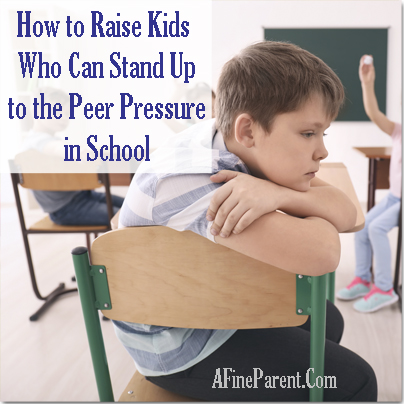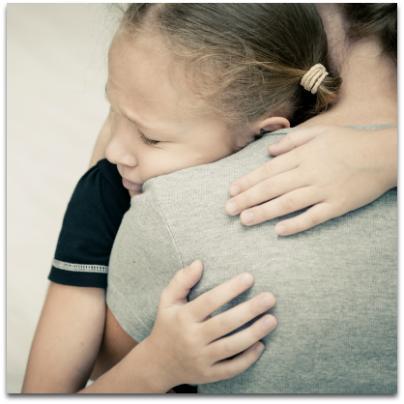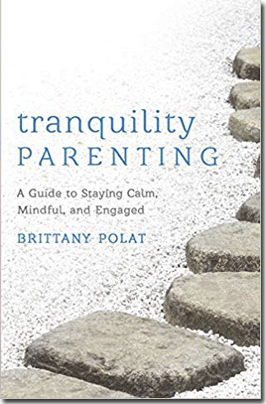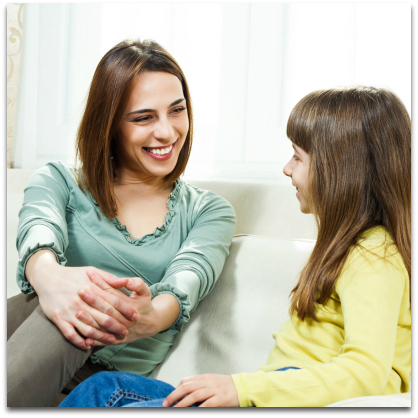 Going to school for many kids is like going to war each and every day. It is a battleground where they are faced with the responsibility of making all kinds of decisions and having to deal with the consequences of their actions.
Going to school for many kids is like going to war each and every day. It is a battleground where they are faced with the responsibility of making all kinds of decisions and having to deal with the consequences of their actions.
You see, making decisions independently is hard enough for a child. However, when faced with pressure from their peers to make a decision one way or the other, it becomes a whole new ball game.
There are so many more pressures that kids face today than ever before in history. The traditional pressures of smoking, drinking and drugs continue to pervade our society. But these days children have to engage on two different fronts: making wise decisions in person, and while using technology in the cyberworld, in particular on social media.
As a middle school teacher of 20 years, I have seen the evolution of challenges and the social pressures and expectations that kids face. Peer pressure to look and act a certain way, say the right things to be accepted into the “in-crowd,” play the “cool” games everyone else is playing, wear the latest designer clothing brands everyone else is wearing, and — nowadays — partake in the social media forums everyone else is taking part in.
In essence, kids are always being pressured to fit in. This results in them having to make choices that oftentimes put their values to the test and can have serious consequences for their safety and well-being.
The message many kids receive is simple: “You either join us or get left behind.” Or in some cases…you get teased or even flat-out bullied.
What Does Peer Pressure Look Like?
 Peer pressure can come in many forms and can happen at any time during the school years (and beyond!) in a wide range of settings.
Peer pressure can come in many forms and can happen at any time during the school years (and beyond!) in a wide range of settings.
I have heard gossip and witnessed drama unfold in the lunchroom, at the bus waiting area before and after school, in the hallways during and after school hours, on the sports field, and inside the classroom.
Here are some examples of different kinds of peer pressure or moral dilemmas I’ve overheard kids be faced with:
“Do you still hang out with Jane? She’s so creepy and has no friends.”
“Come sit at our lunch table today. Jake won’t care. Nobody likes him anyway.”
“Come on…come to the party tonight. Everyone else is going.”
“Can I see what you wrote for numbers 3 and 4 on the homework?”
“What was on the math quiz?”
“We’re all skipping school tomorrow and headed to the beach. You should come.”
“I don’t want to play that game. You can play soccer with us or else find someone else to play with.”
“Your lunchbox is so girly. I don’t want to eat lunch with a girl.”
“Let’s go downtown and I’ll meet you behind the gas station. I took some cigarettes from my dad’s house.”
“We’re all going up to the Cape this weekend to hang out at Frank’s parents’ beach house. They aren’t going to be there so the house will be all to ourselves. You should come.”
What Can You Do to Help Your Child Stand Up to Negative Peer Pressure?
 There is so much more responsibility that rests on your shoulders these days as a parent. Making sure your child is safe, eats nutritious meals regularly, obtains plenty of daily physical activity, and receives a good education at school are all important pieces to the larger picture that lies within your child’s overall well-being.
There is so much more responsibility that rests on your shoulders these days as a parent. Making sure your child is safe, eats nutritious meals regularly, obtains plenty of daily physical activity, and receives a good education at school are all important pieces to the larger picture that lies within your child’s overall well-being.
Here are some steps you can take to help your child gain self-confidence and stand up to negative peer pressure.
BE AWARE
Every parent hopes that their child will grow up to be a positive role model and make good decisions, while helping others do the same. There are a handful of kids that I see from time-to-time with this winsome character. They demonstrate a good-natured, friendly attitude toward each person they meet and are well liked and respected by their peers. Sometimes I see these kids challenge others to see who can get more high fives from other kids. This is an example of positive peer pressure.
Unfortunately, this kind of peer pressure isn’t all too common among youth. Rather, children most often experience negative peer pressure, where they are tested to compromise their interests, friendships and values.
There are two main types of negative peer pressure:
Direct negative peer pressure is when a child is specifically asked to do something. “Have a drink.” “Try a cigarette.” “Join a group that would exclude someone else.” This is a powerful form of peer pressure because children are directly confronted with a decision that will put them at risk for being made fun of, isolated, losing friends and/or potentially being bullied.
Indirect negative peer pressure is when a child sees or hears certain behaviors that others are exhibiting, which can influence the choices they make. This kind of pressure can take place while observing peers, siblings and prominent figures in the media and throughout the entertainment world. For instance, when a girl sees her friends coming to school dressed in low-cut shirts and mini-skirts, there is pressure to dress in the same manner, even if she might feel uncomfortable to do so.
Be aware and listen to your child. Take the opportunity each day to ask them about their day. Take the good with the bad. Ask them about their favorite part of the day and to express if there was anything on their mind that was bothering them that they would like to talk about. (If you can use some help with this, here are 100+ questions you can ask your kids that will make you a better parent.)
Monitor their peer group and look out for any radical changes in your child’s behavior and/or appearance, as those are warning signs for a much larger problem at hand.
DEMONSTRATE CONFIDENCE
 There are a number of children I’ve seen over the years who lack the self-assurance to stand up for themselves, let alone others. Many of these kids are riddled with anxiety, literally sick to the stomach when faced with any adversity or having to make a decision to do something. They don’t know what to do or what to say in different social situations. Oftentimes, they impose negative self-talk and beat themselves up emotionally.
There are a number of children I’ve seen over the years who lack the self-assurance to stand up for themselves, let alone others. Many of these kids are riddled with anxiety, literally sick to the stomach when faced with any adversity or having to make a decision to do something. They don’t know what to do or what to say in different social situations. Oftentimes, they impose negative self-talk and beat themselves up emotionally.
The importance of positive self-talk stems from loving yourself. In the book Tranquility Parenting, the author Brittany Polat discusses what it means for parents to love their children “truly and deeply.” Polat expresses that parental affection reveals itself in two main activities: acting virtuously yourself and teaching your child virtue.
 So what is virtue? It is the act of exemplifying moral excellence. Polat states that it is the “path to eudaimonia, which is absolute flourishing and happiness.” Parents who promulgate this value through their own actions and encourage this behavior from their children are demonstrating the ultimate expression of love and helping their children discover this path.
So what is virtue? It is the act of exemplifying moral excellence. Polat states that it is the “path to eudaimonia, which is absolute flourishing and happiness.” Parents who promulgate this value through their own actions and encourage this behavior from their children are demonstrating the ultimate expression of love and helping their children discover this path.
When parents demonstrate conscientious behavior by being responsible global citizens on a daily basis, they become powerful moral teachers for their children.
For instance, taking action to reduce plastic pollution by refusing single use plastic bags, volunteering to clean up trash as part of a community service project and/or attending environmentally-themed events in the community demonstrate wonderful examples of moral behavior for a child to see. This can demonstrate to children the importance of standing up for themselves and their beliefs.
SEND EMPOWERING MESSAGES TO YOUR CHILD
 Keeping tabs on your child’s peer group is very important, especially throughout the formative years of their growth and development.
Keeping tabs on your child’s peer group is very important, especially throughout the formative years of their growth and development.
But when it comes to intervening in your child’s peer group, it can be a slippery slope.
When you feel that your child is spending too much time with another child who could be a bad influence and potentially sway your child to do something that he or she wouldn’t normally do, what do you say?
First, let’s consider the following statements:
“Stay away from that boy. He will bring you down!”
“You are forbidden to see that girl because you will become just like her!”
Words like “forbidden” or “stay away” are a sure-fire way to get your child to spend even more time with that person or peer group! These kinds of statements should be avoided. They send the wrong message to your child, the message that they are weak and incapable of making sound judgments.
Instead, express empowering statements that demonstrate a level of trust you have for your child and the decisions he or she makes, while also emphasizing the notion that decisions have consequences.
Try these:
“I have complete confidence that you will make the right decision in the moment.”
“You are a smart kid. Use your own judgment and don’t let others influence your decision making.”
“People make choices in this world. Before you act, think, ‘Is this decision I am about to make getting me a step closer to the best version of myself?’”
EDUCATE YOUR CHILD ON PEER PRESSURE
 It is easier said than done to say “no” to negative peer pressure. Why is that?
It is easier said than done to say “no” to negative peer pressure. Why is that?
Many kids long to fit in and are often concerned that other kids might ridicule them and/or exclude them from a particular group. Some kids fall to peer pressure due to being curious about trying something new. Others follow the crowd because “everyone else is doing it” and they don’t want to be left out.
Communicate the message to your child that peer pressure is common during these years of their life. However, if it feels wrong, you probably shouldn’t be doing it.
I often pull students aside who I see are making poor choices repeatedly and ask them to consider if their choices are helping them become the best version of themselves or if their actions are based out of fear of not being accepted and/or fear of being picked on.
ALLOW YOUR CHILD TO EXPERIENCE NEW THINGS
 Expose your child to many different things early on in their life so they are able to acquire new skills. Praise your child’s effort over their outcomes, and allow them to fail. Learning to persevere is an important trait that builds resilience, self-confidence and self-esteem.
Expose your child to many different things early on in their life so they are able to acquire new skills. Praise your child’s effort over their outcomes, and allow them to fail. Learning to persevere is an important trait that builds resilience, self-confidence and self-esteem.
Trying new things also allows a child to take ownership for their actions as they learn to intrinsically enjoy the fruits of what they’ve sown or reap the consequences for the poor choices they’ve made.
It is important for adolescents, in particular, to participate in extracurricular activities. Students who partake in these activities demonstrate an improvement in their academic achievement and social life. These activities help reduce many peer-pressure-related problems and expose a child to opportunities to explore their interests and talents.
The 2-Minute Action Plan for Fine Parents
For our quick action today, try asking yourself these five questions:
- How do you demonstrate leadership and confidence to your children on a daily basis?
- How do you encourage these same qualities in your children?
- How did it make you feel when you stood up to someone or said “no” to something you didn’t want to do?
- Did you ever “follow the crowd” and do something you didn’t want to?
- Did you feel remorse or suffer any unintended consequences in the short or long term from that decision?
The Ongoing Action Plan for Fine Parents
Over the next week try this:
- Work with your child to develop a plan for when he or she is faced with negative peer pressure and having to make a decision. For instance, your child could use you as an excuse for why they can’t do something (“My parents would ground me forever if they found out.” or “I can’t go because I have other plans that I’ve already committed to doing.” They could also say that they are allergic or get really sick from…(tobacco, alcohol, drugs).
- Have empathy for your child and listen to what he/she has to say with the intention to understand, rather than reprimand.
- Set goals with your child. Helping your child turn their dreams into a reality through a plan builds a child’s confidence and the skills they need to handle challenges and adversity throughout their life.
- Encourage your child to have open, non-judgmental conversations with trusting adults. Parents, teachers, counselors and therapists can help provide a specific strategy to help a child feel best equipped with handling adversity and standing up to make wise choices for themselves and others.
I was surfing the net and luckily came across this site and found some very interesting stuff here
Thanks for sharing these tips. These are some best tips to not just stand up to peer pressure but also to raise smart kids. I have followed some of these tips with my daughter when she started elementary school like, being confident about her and making her feel more confident about the choices she makes in her life. They have indeed proved to be helpful.
Yes, it is very important for children, especially daughters, to experience a sense of confidence early in life. Keep up the great job with your daughter. Thank you for your positive feedback. It is very much appreciated.
I’m eager to reveal this page. I have to thank you for ones time for this especially phenomenal read !! I certainly truly preferred all aspects of it and I additionally have you spared to fav to take a gander at new data in your site. This articles causes me more.Thanks for your sharing,I will pay more considerations to your blog. Anticipating your better and better articles.See you next time.
Thank you. Your kinds words are very much appreciated.
How to Raise Kids Who Can Stand Up to the Peer Pressure in School Very Nice Thanks For Sharing Such a Beautiful Article.
I am glad that you enjoyed it and that it was helpful.